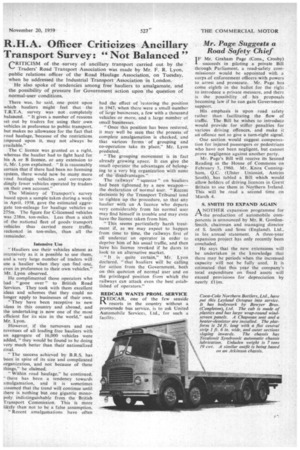R.H.A. Officer Criticizes• Ancillary Transport Survey: "Not Balanced"
Page 37

If you've noticed an error in this article please click here to report it so we can fix it.
CRITICISM of the survey of ancillary transport carried out by the Traders' Road Transport Association was made by Mr. F. R. Lyon, public relations officer of the Road Haulage Association, on Tuesday,
when he addressed the Industrial Transport Association in London. • He also spoke of tendencies among free hauliers to amalgamate, and the possibility of pressure for Government action upon the question of normal-user conditions.
There was, he said, one point upon which hauliers might feel that the T.R.T.A. survey was not completely balanced. "it gives a number of reasons set out by traders for using their own vehicles in preference to public transport, but makes no allowance for the fact that road haulage, because of the restrictions imposed upon it, may not always be available."
The C licence was granted as a right, whereas the haulier had to fight hard for his A or B licence, or any extension to it, Mr. Lyon explained. "It is reasonably certain that if there had been no licensing system, there would now be many more road haulage vehicles and correspondingly fewer vehicles operated by traders on their own account."
The Ministry of Transport's survey based upon a sample taken during a week in April, 1958, gave the estimated aggregate ton-mileage for haulage vehicles as 275m. The figure for C-licensed vehicles was 238m. ton-miles. Less than a sixth of the national fleet of goods' transport ve-hicles thus carried more traffic, reckoned in ton-miles, than all the remainder.
Intensive Use "Hauliers use their vehicles almost as intensively as it is possible to use them, and a very large number of traders will use a haulier when they can find one, even in preference to their own vehicles." Mr. Lyon observed.
He complimented those operators who had "gone over" to British Road Services. They took with them excellent ideas and schemes that they could no longer apply to businesses of their own.
"They have been receptive to new ideas in this country and abroad, and the undertaking is now one of the most efficient for its size in the world," said Mr. Lyon.
However, if the turnovers and net revenues of all leading free hauliers with an aggregate of 16,000 vehicles were added, "they would be found to be doing very much better than their nationalized rival.
"The success achieved by B.R.S. has been in spite of its size and complicated organization, and not because of these things," he claimed.
"Within road haulage," he continued, there has been a tendency towards amalgamation, and it is sometimes assumed that the trend will continue until there is nothing but one gigantic monopoly indistinguishable from the British Transport Commission. This is more lilcely than not to be a false assumption.
"Recent amalgamations have often
had the effect of 'restoring the position in 1247, when there were a small number of large businesses, a few with a thousand vehicles or more, and a large number of small businesses.
"Once this position has been restored, it may well be seen that the process of complete amalgamation is checked, and that various forms of grouping and co-operation take its place," Mr. Lyon predicted.
"The grouping movement is in fact already growing apace. It can give the small operator the advantages of belonging to a very big organization with none of the disadvantages."
The railways' "squeeze " on hauliers had been tightened. by a new weapon— the declaration of normal User. "Recent decisions bY the Transport Tribunal tend to tighten up the procedure, so that any haulier with an A licence who departs very considerably from his normal user may find himself in trouble and may even have the licence taken from him.
"This seems particularly harsh treatment if, as we may expect to happen from time to time, the railways first of all undercut an operator in order to deprive him of his usual traffic, and then have his licence revoked if he dares to look to an alternative market.
" It is quite certain," Mr. Lyon declared, "that hauliers will be calling for action from the Government, both on this question of normal user and on the privileged position from which the railways can attack even the best established of operators."
REDCAR WANTS PROM. SERVICE
REDCAR, one of the few seaside I N. resorts in the country without a promenade bus service, is to ask United Automobile Services, Ltd., for such a facility.




































































































